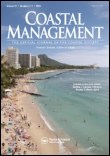 A recent paper by Bremer and Glavovic (2013) reviews the practice and theory of the science-policy interface in integrated coastal management (ICM). They describe two interpretations of the science-policy interface: the science-based interface and the participatory interface. Advocates of the science-based interface see the inherent uncertainty in science as a lack of available information, warranting the creation of new science to fill gaps in information delivered to decision-makers. Alternatively, advocates of the participatory approach view uncertainty as inevitable, necessitating the integration of existing knowledge, including scientific knowledge and local knowledge among others, in an interdisciplinary approach. Knowledge mobilization is seen to be dependent on the characteristics of each science-policy interface.
A recent paper by Bremer and Glavovic (2013) reviews the practice and theory of the science-policy interface in integrated coastal management (ICM). They describe two interpretations of the science-policy interface: the science-based interface and the participatory interface. Advocates of the science-based interface see the inherent uncertainty in science as a lack of available information, warranting the creation of new science to fill gaps in information delivered to decision-makers. Alternatively, advocates of the participatory approach view uncertainty as inevitable, necessitating the integration of existing knowledge, including scientific knowledge and local knowledge among others, in an interdisciplinary approach. Knowledge mobilization is seen to be dependent on the characteristics of each science-policy interface.
Since the 1992 United Nations Conference on Environment and Development (UNCED), integrated coastal management has become well-known globally as a central organizational concept for sustainable management. But given the growing global focus on ecosystem-based management, operationalizing ICM has become more complex as a result of the shift from models of resource management to models of governance. Bremer and Glavovic’s review demonstrates the strong tradition in ICM practice to support a science-based interface. However, with the evidence of shifts in governance models, the authors favour a participatory interface to promote knowledge mobilization.
The authors present four principles for framing the science-policy interface as a governance setting to facilitate information and knowledge mobilization within more participatory approaches. By defining the interface as a “governance setting,” they imply that “scientific advice is negotiated in terms of political interactions that characterize coastal governance, constituting the co-construction of knowledge and politics or values across the diversity of coastal stakeholders” (Bremer & Glavovic, 2013, p. 52). To mobilize knowledge, the settings must facilitate dialogue across disciplines. The settings must facilitate a participatory approach where all stakeholders and their perspectives are accommodated. The settings must also be integrated to incorporate all disparate knowledge systems, i.e., even inconsistent perspectives are accommodated and attempts are made to reconcile conflicting perspectives. Lastly, the settings must also emphasize characteristics of quality, e.g., the best dialogue possible, or information and knowledge mobilization through an evaluation by the widest range of stakeholders possible.
Bremer and Glavovic (2013) propose a new epistemology based on knowledge mobilization in integrated coastal management. In the process, they highlight common barriers to the uptake of scientific information in environmental policy-making as has also been elucidated in the EIUI’s case studies on awareness, use, and influence of state-of-the-coast and marine environmental reports (e.g., Soomai, MacDonald, & Wells, 2013). These barriers include the different ways of dealing with scientific uncertainty by scientists and policy-makers, a lack of inclusiveness related to the involvement of diverse peer-communities in the production of information, and inadequate consultation with a wide range of key stakeholders in public policy-making.
References
Bremer, S., & Glavovic, B. (2013). Mobilizing knowledge for coastal governance: Re-framing the science-policy interface for integrated coastal management. Coastal Management (41)1, 39-56.
Soomai, S. S., MacDonald, B.H., & Wells, P.G. (2013). Communicating environmental information to the stakeholders in coastal and marine policy-making: Case studies from Nova Scotia and the Gulf of Maine/Bay of Fundy region. Marine Policy, 40, 176-186.
Author: Suzuette S. Soomai